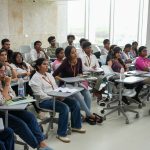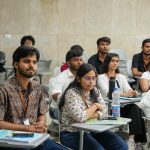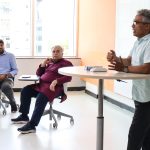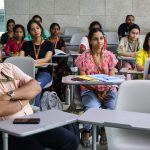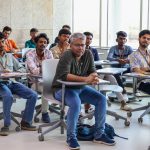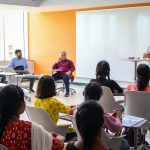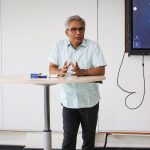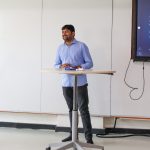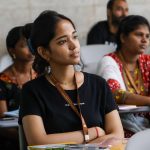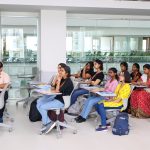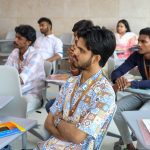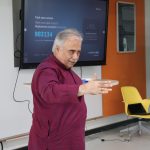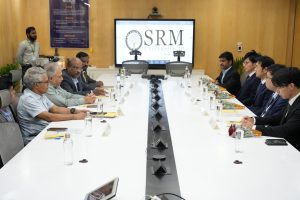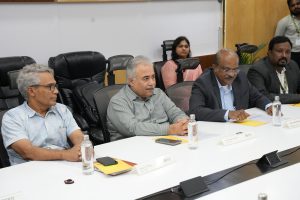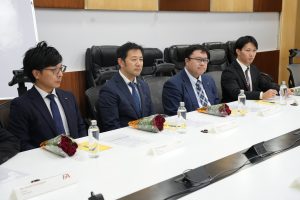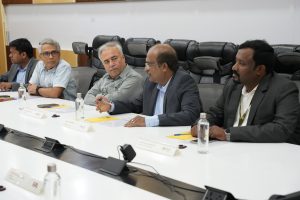Chetna: Awakening Mathematical Minds
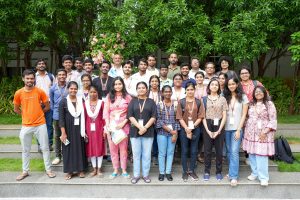 The Department of Mathematics at SRM University-AP successfully conducted a two-week summer programme “Chetna: Awakening Mathematical Minds” from June 17th to June 28th, 2024. This programme aimed to inspire and enhance mathematical understanding among participants from various parts of the country. The programme saw enthusiastic participation from 25 students hailing from different states across India, including West Bengal, Assam, Kerala, Karnataka, Tamil Nadu, Maharashtra, Gujarat, Delhi and Andhra Pradesh.
The Department of Mathematics at SRM University-AP successfully conducted a two-week summer programme “Chetna: Awakening Mathematical Minds” from June 17th to June 28th, 2024. This programme aimed to inspire and enhance mathematical understanding among participants from various parts of the country. The programme saw enthusiastic participation from 25 students hailing from different states across India, including West Bengal, Assam, Kerala, Karnataka, Tamil Nadu, Maharashtra, Gujarat, Delhi and Andhra Pradesh.
The programme featured a diverse curriculum, covering a wide range of mathematical topics. Eleven subjects were taught by eleven distinguished faculty members from the Department of Mathematics. The subjects provided a broad and enriching mathematical experience, designed to ignite a passion for mathematics in the participants.
Insights of the Two-Week Programme
First Week Highlights
1. Number Theory by Prof. Kalyan Chakraborty
The first week began with an in-depth exploration of Number Theory. Prof. Kalyan Chakraborty introduced participants to fundamental concepts such as divisibility, prime numbers, and modular arithmetic. The engaging sessions provided a strong foundation in understanding the properties and applications of numbers.
2. Abstract Algebra by Dr Anirban Bose
Dr Anirban Bose led the sessions on Abstract Algebra, diving into structures like groups, rings, and fields. The course covered essential algebraic concepts and their applications, enhancing the participants’ problem-solving skills and theoretical knowledge.
3. Linear Algebra and Basic Operators by Dr Animesh Bhandari
Dr Animesh’s lectures on Linear Algebra included topics such as vector spaces, linear transformations, and matrices. The sessions aimed to build a solid understanding of linear systems and the role of operators in mathematical computations.
4. Graph Theory by Dr Fouzul Atik
Graph Theory, taught by Dr Fouzul Atik, introduced participants to the study of graphs, which are mathematical structures used to model pairwise relations between objects. Topics included graph traversal, connectivity, and graph colouring, providing insights into the practical applications of graph theory.
5. Ordinary Differential Equation by Dr Nityananda Roy
The week concluded with Dr Nityananda Roy’s sessions on Ordinary Differential Equations (ODEs). This course covered methods of solving first-order and higher-order ODEs, along with real-world applications of differential equations in various fields.
Second Week Highlights
1. Advanced Algebra by Dr Kalyan Banerjee
Building on the first week, this subject delved deeper into algebraic structures, including advanced group theory and ring theory, preparing students for research-level problems.
2. Metric Spaces by Dr Choiti Bandyopadhyay
Dr Choiti’s sessions on Metric Spaces introduced participants to the concepts of distance and convergence in metric spaces. Topics included open and closed sets, continuity, and compactness, providing a deeper understanding of analysis.
3. Foundations of Probability and Statistics by Dr Vijayakrishna Rowthu
Dr. Vijayakrishna covered the Foundations of Probability and Statistics, focusing on probability theory, random variables, and statistical inference. The course aimed to equip participants with the skills needed to analyze and interpret data.
4. Mathematical Modelling by Dr Tapan Kumar Hota
Dr. Tapan’s lectures on Mathematical Modelling demonstrated how mathematics can be used to represent, analyse, and solve real-world problems. The course included case studies and practical applications in various disciplines.
5. Partial Differential Equation by Dr Ram Baran Verma
The sessions on Partial Differential Equations (PDEs) by Dr Ram Baran explored methods of solving PDEs and their applications in physics and engineering. Topics included separation of variables, Fourier series, and boundary value problems.
6. Math Education by Dr Jayasree Subramanian
The final course on Math Education, taught by Dr Jayasree, focused on pedagogical approaches and techniques for teaching mathematics effectively. The sessions aimed to inspire future educators and enhance their teaching methodologies.
Conclusion
The “Chetna: Awakening Mathematical Minds” summer programme was a resounding success, providing participants with valuable insights and knowledge in mathematics. The diverse backgrounds of the participants and the expertise of the faculty created a vibrant and stimulating learning environment, fostering a deeper appreciation for the subject. The Department of Mathematics at SRM University -AP looks forward to organising similar programmes in the future to continue inspiring young mathematical minds across the country.
- Published in Departmental News, Math News, News
SRM AP Signs MoU with Human Resocia to Create Employment Opportunities in Japan for Students
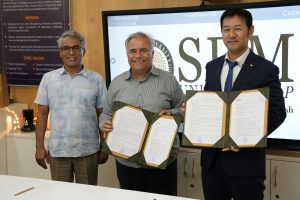 SRM University-AP has signed an MoU with Human Resocia to facilitate employment and job opportunities for university students in Japan. This collaborative agreement partners HR to provide all the necessary facilities required for students to pursue career opportunities in Japan.
SRM University-AP has signed an MoU with Human Resocia to facilitate employment and job opportunities for university students in Japan. This collaborative agreement partners HR to provide all the necessary facilities required for students to pursue career opportunities in Japan.
The MoU signing ceremony, organised yesterday, was honoured by esteemed individuals, including Prof. Manoj K Arora, Vice Chancellor of SRM University-AP, Dr M S Vivekanandan, Director of CRCS, Prof. C V Tomy, Dean SEAS, Mr Laxmanan Angu Raju, AGM of CRCS, Mr K Jotish Kumar, CEO of SRM Global, along with representatives from Human Resocia (HR) such as Mr Takeshi Tominaga, Mr Yuji Sakaguchi, Mr Taketo Fukuda, Mr Kagotani Takuya, and Mr Senthil Sellappan.
This Alliance between SRM University-AP and HR will primarily focus on recruiting students, providing Japanese language learning for recruitment in Japan as well as to identify opportunities where both entities can collaborate with Japanese universities or other relevant stakeholders of Japan be it academic or industry. With a goal to develop the employability and cross-cultural learning experience of students, this collaboration is all set for mutual growth and development.
Prof. Manoj K Arora, Vice Chancellor of SRM University-AP, expressed his enthusiasm: “This strategic partnership with Human Resocia marks a milestone in our efforts to provide international career opportunities for our students in Japan. We are very excited about the prospects that this MoU brings, and we are committed to preparing our students for successful careers ahead.”
Human Resocia Co., Ltd. is a recruiting and dispatch company in Japan that has been established for more than 30 years. It specialises in helping individuals develop their careers as IT engineers in the nation. Their rich experience in understanding the evolving needs of job seekers and how to help millions of job seekers and lakhs of recruiters like no one else does makes them a perfect ally, and we are happy that they trust us on this step.
This MoU signifies a significant step towards empowering students of SRM University-AP to begin a promising career path in Japan. It reflects the University’s commitment to providing holistic opportunities for professional growth and international exposure.
- Published in CR&CS, CR&CS NEWS, Departmental News, News
SRM AP Vice Chancellor Nominated to Prestigious AIU Governing Council
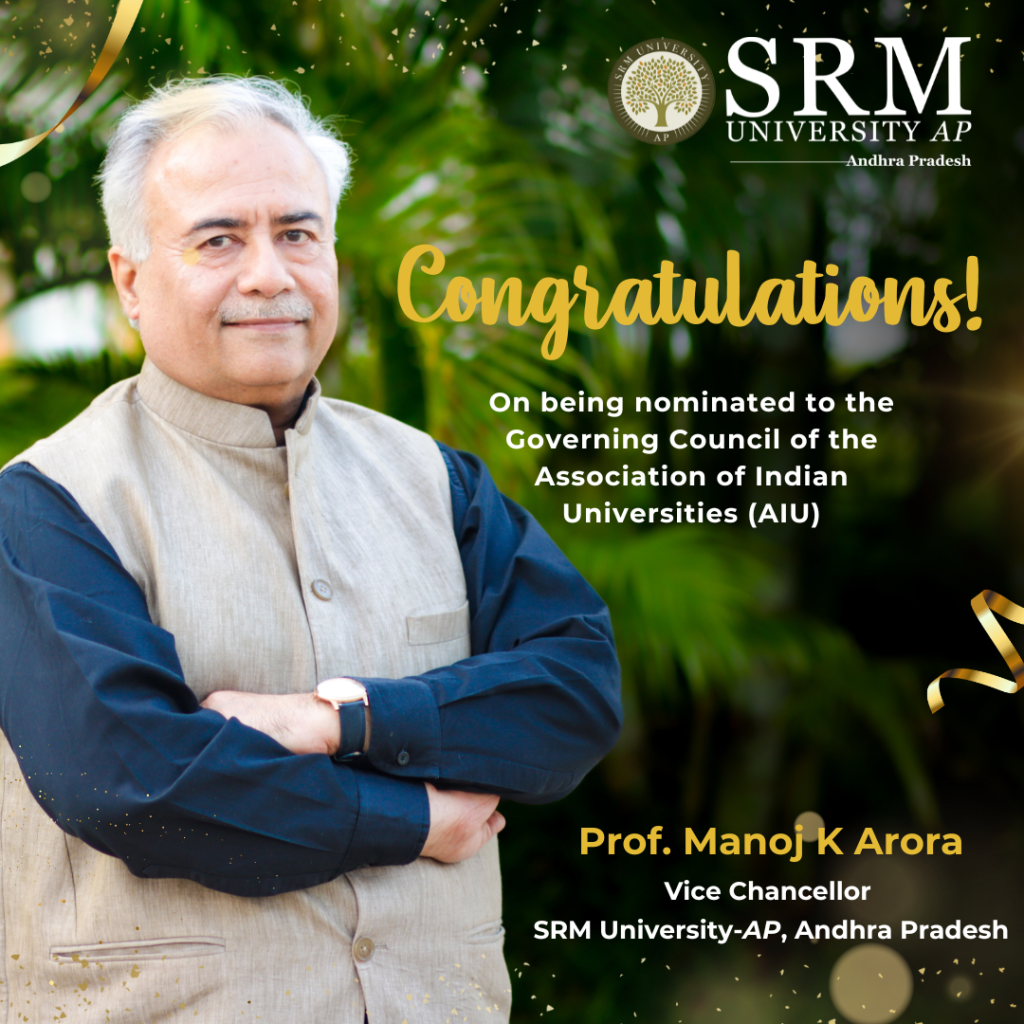 A proud moment for SRM University-AP as it announces the nomination of its esteemed Vice Chancellor, Prof. Manoj K Arora, to the Governing Council of the Association of Indian Universities (AIU). The Association of Indian Universities (AIU) serves as a paramount inter-university organisation actively involved in the advancement and nurturing of higher education.
A proud moment for SRM University-AP as it announces the nomination of its esteemed Vice Chancellor, Prof. Manoj K Arora, to the Governing Council of the Association of Indian Universities (AIU). The Association of Indian Universities (AIU) serves as a paramount inter-university organisation actively involved in the advancement and nurturing of higher education.
On accepting this nomination, Prof. Arora remarked, “I am deeply humbled to have been nominated as a member of AIU and look forward to it. This nomination reflects our collective efforts towards advancing higher education and fostering collaboration, thereby working towards changing the face of higher education in India.”
This notable appointment not only recognises Prof. Arora’s outstanding contributions to the academic fraternity but also underscores SRM University-AP‘s commitment to excellence in higher education. The AIU plays a pivotal role in elevating the quality and accessibility of higher education across the nation. The AIU, with its broad membership including international institutions from Bangladesh, Bhutan, Kazakhstan, Malaysia, Mauritius, Nepal, Thailand, the UAE, and the UK, serves as a platform for global educational exchange and development. Its endeavours are directed toward creating a collaborative and innovative educational landscape, making this nomination significant for SRM University-AP and the broader academic community.
Prof. Arora’s nomination is a moment of pride not only for him but for the entire SRM AP fraternity. The university community extends its heartfelt congratulations to Prof. Arora on this noteworthy achievement and eagerly anticipates his ongoing guidance and foresight in steering the course of education in India.
Innovating Human Resources: A Blockchain Technology Bibliometric Analysis
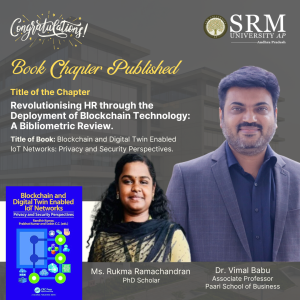 In a significant academic achievement, Dr Vimal Babu, Associate Professor at the Department of Management, Paari School of Business, and Ms Rukma Ramachandran, a PhD Scholar, have co-authored a book chapter titled “Revolutionizing HR through the Deployment of Blockchain Technology: A Bibliometric Review.” The chapter is included in the book Blockchain and Digital Twin Enabled IoT Networks: Privacy and Security Perspectives, published by Routledge: A Taylor and Francis Group.
In a significant academic achievement, Dr Vimal Babu, Associate Professor at the Department of Management, Paari School of Business, and Ms Rukma Ramachandran, a PhD Scholar, have co-authored a book chapter titled “Revolutionizing HR through the Deployment of Blockchain Technology: A Bibliometric Review.” The chapter is included in the book Blockchain and Digital Twin Enabled IoT Networks: Privacy and Security Perspectives, published by Routledge: A Taylor and Francis Group.
The research work delves into the potential of blockchain technology in transforming Human Resources practices, offering a bibliometric review to shed light on the impact and future possibilities within the field.
The publication adds valuable insights to the growing discourse on blockchain applications in various industries, particularly focusing on HR management. This collaborative effort between Dr Vimal Babu and Ms Rukma Ramachandran highlights their dedication to exploring innovative solutions at the intersection of technology and management. Their contribution to the book aims to contribute to the ongoing dialogue on privacy, security, and efficiency in IoT networks, with blockchain technology playing a pivotal role in shaping the digital landscape.
The chapter’s publication signifies a notable milestone in the academic pursuits of both scholars, solidifying their expertise and thought leadership in the realm of blockchain technology and its implications for HR practices. Their contribution is expected to resonate with professionals, researchers, and students interested in the evolving dynamics of digital innovation and its impact on organisational processes.
Brief Introduction of the Book Chapter
The adoption and implementation of Blockchain in Management have been gaining increasing attention. The rise in the number of studies on Blockchain in managerial applications invites a greater number of research contributions in this field. This chapter describes the gap in the present studies using a hybrid review system through the means of systematic literature review and bibliometric analysis.
Publication details (incl. Publisher, ISBN, Launch date, Edition, etc)
Publisher- Taylor & Francis
ISBN- 9781003403791
Launch date- 19 July 2024
Edition- 1st
Target Audience of the Book Chapter
This book emphasizes and facilitates a greater understanding of various data security privacy approaches using the advances in Blockchain and data analysis using machine/deep learning, federated learning, edge computing and the countermeasures to overcome these vulnerabilities.
Link to the Book Chapter
Blockchain and Digital Twin Enabled IoT Networks | Privacy and Securit (taylorfrancis.com)
- Published in Departmental News, News, Paari Current Happenings, Research News


